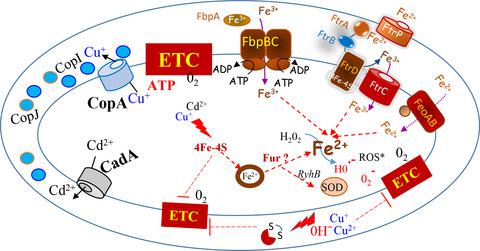当前位置:
X-MOL 学术
›
Microb. Biotechnol.
›
论文详情
Our official English website, www.x-mol.net, welcomes your
feedback! (Note: you will need to create a separate account there.)
Increasing the copper sensitivity of microorganisms by restricting iron supply, a strategy for bio-management practices.
Microbial Biotechnology ( IF 4.8 ) Pub Date : 2020-06-19 , DOI: 10.1111/1751-7915.13590 Anne Soisig Steunou 1 , Marie-Line Bourbon 1 , Marion Babot 1 , Anne Durand 1 , Sylviane Liotenberg 1 , Yoshiharu Yamaichi 1 , Soufian Ouchane 1
Microbial Biotechnology ( IF 4.8 ) Pub Date : 2020-06-19 , DOI: 10.1111/1751-7915.13590 Anne Soisig Steunou 1 , Marie-Line Bourbon 1 , Marion Babot 1 , Anne Durand 1 , Sylviane Liotenberg 1 , Yoshiharu Yamaichi 1 , Soufian Ouchane 1
Affiliation

|
Pollution by copper (Cu2+) extensively used as antimicrobial in agriculture and farming represents a threat to the environment and human health. Finding ways to make microorganisms sensitive to lower metal concentrations could help decreasing the use of Cu2+ in agriculture. In this respect, we showed that limiting iron (Fe) uptake makes bacteria much more susceptible to Cu2+ or Cd2+ poisoning. Using efflux mutants of the purple bacterium Rubrivivax gelatinosus, we showed that Cu+ and Cd2+ resistance relies on the expression of the Fur‐regulated FbpABC and Ftr iron transporters. To support this conclusion, inactivation of these Fe‐importers in the Cu+ or Cd2+‐ATPase efflux mutants gave rise to hypersensitivity towards these ions. Moreover, in metal overloaded cells the expression of FbpA, the periplasmic iron‐binding component of the ferric ion transport FbpABC system was induced, suggesting that cells perceived an ‘iron‐starvation’ situation and responded to it by inducing Fe‐importers. In this context, the Fe‐Sod activity increased in response to Fe homoeostasis dysregulation. Similar results were obtained for Vibrio cholerae and Escherichia coli, suggesting that perturbation of Fe‐homoeostasis by metal excess appeared as an adaptive response commonly used by a variety of bacteria. The presented data support a model in which metal excess induces Fe‐uptake to support [4Fe‐4S] synthesis and thereby induce ROS detoxification system.
中文翻译:

通过限制铁供应来提高微生物对铜的敏感性,这是生物管理实践的一种策略。
在农业和耕种中广泛用作抗菌剂的铜 (Cu 2+ ) 造成的污染对环境和人类健康构成威胁。寻找使微生物对较低金属浓度敏感的方法可能有助于减少农业中 Cu 2 +的使用。在这方面,我们表明限制铁 (Fe) 吸收会使细菌更容易受到Cu 2+或 Cd 2+中毒。使用紫色细菌Rubrivivax gelatinosus 的外排突变体,我们发现 Cu +和 Cd 2+抗性依赖于 Fur 调节的 FbpABC 和 Ftr 铁转运蛋白的表达。为了支持这一结论,Cu +或 Cd 2+ ATPase 外排突变体中这些 Fe 输入蛋白的失活导致了对这些离子的超敏反应。此外,在金属超载的细胞中,FbpA(铁离子转运FbpABC系统的周质铁结合成分)的表达被诱导,这表明细胞感知到“铁饥饿”情况并通过诱导铁输入物来对此做出反应。在这种情况下,Fe-Sod 活性因铁稳态失调而增加。霍乱弧菌和大肠杆菌也获得了类似的结果,表明金属过量对铁稳态的扰动似乎是多种细菌常用的适应性反应。所提供的数据支持一个模型,其中金属过量诱导 Fe 吸收以支持 [4Fe-4S] 合成,从而诱导 ROS 解毒系统。
更新日期:2020-06-19
中文翻译:

通过限制铁供应来提高微生物对铜的敏感性,这是生物管理实践的一种策略。
在农业和耕种中广泛用作抗菌剂的铜 (Cu 2+ ) 造成的污染对环境和人类健康构成威胁。寻找使微生物对较低金属浓度敏感的方法可能有助于减少农业中 Cu 2 +的使用。在这方面,我们表明限制铁 (Fe) 吸收会使细菌更容易受到Cu 2+或 Cd 2+中毒。使用紫色细菌Rubrivivax gelatinosus 的外排突变体,我们发现 Cu +和 Cd 2+抗性依赖于 Fur 调节的 FbpABC 和 Ftr 铁转运蛋白的表达。为了支持这一结论,Cu +或 Cd 2+ ATPase 外排突变体中这些 Fe 输入蛋白的失活导致了对这些离子的超敏反应。此外,在金属超载的细胞中,FbpA(铁离子转运FbpABC系统的周质铁结合成分)的表达被诱导,这表明细胞感知到“铁饥饿”情况并通过诱导铁输入物来对此做出反应。在这种情况下,Fe-Sod 活性因铁稳态失调而增加。霍乱弧菌和大肠杆菌也获得了类似的结果,表明金属过量对铁稳态的扰动似乎是多种细菌常用的适应性反应。所提供的数据支持一个模型,其中金属过量诱导 Fe 吸收以支持 [4Fe-4S] 合成,从而诱导 ROS 解毒系统。











































 京公网安备 11010802027423号
京公网安备 11010802027423号